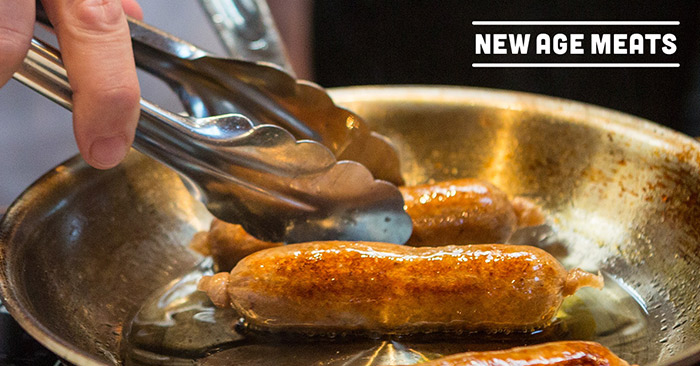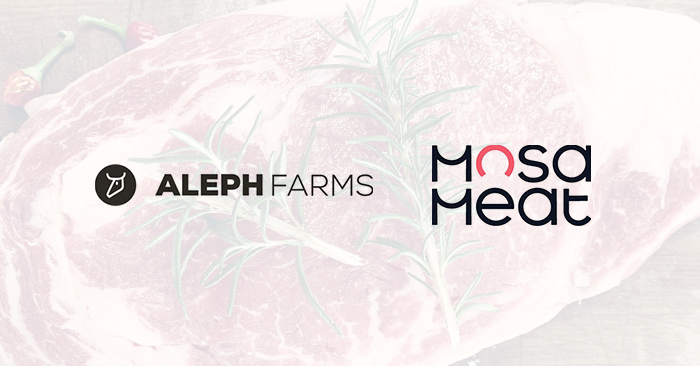Investment Roundup: Cell-Cultured Meat Companies Secure New Capital
Cell-cultured meat companies are catching the eyes of investors with new form factors and taste and texture more closely aligned to traditional meat.
While yet to gain regulatory approval in the U.S., the USDA and FDA announced last month its plans to establish labeling requirements for these products, and companies are gearing up for potential commercial launches as soon as next year, pending approval. Meanwhile, others have their sights set on global markets after Singapore approved the sale of Eat Just’s GOOD Meat cell-based chicken last year.

New Age Meats Raises $25M
Berkeley, California-based cultivated meat company New Age Meats announced last week it has raised $25 million in a Series A round to support its goal of starting production of its first products, a variety of cell-based pork sausages, in 2022.
Hanwha Solutions of South Korea led the funding round, with participation from previous investors such as SOSV’s IndieBio, TechU Ventures, ff VC and Siddhi Capital. The new funding brings its total capital to date to $32 million, including a $2 million seed extension in February which included RXBAR founder Peter Rahal’s Litani Ventures.
“This raise facilitates this current phase [of deep technical, product and brand development] we are in and the milestones we want to achieve which include: getting to market for public consumer validation and doing so in a capital efficient manner while scaling the team to bring onboard additional capabilities,” New Age Meats CEO Brian Spears told NOSH.
Spears said Hanwha’s background in the nutrition business made it a “natural choice” as an investor and strategic partner.
“Hanwha, more than any other investor, really got our unique approach and that is to understand why our senses light up when we eat meat — then create a sustainable and humane process that delivers this experience in an affordable and widely available way,” he said.
Founded in 2018, New Age Meats produces hybrid products combining cultured meat with plant-based protein, which the company says improves the texture, taste and nutritional value of its products. This approach also will allow the company to manufacture products more affordably at scale, Spears said, noting brands relying solely on animal cells for their finished products may take longer to do so.
“We spend resources to understand why we love meat, and then design a hybrid product that uses cells to deliver the critical piece that plants can’t,” he said. “This makes our sausages scalable and affordable to match pent up consumer demand.”
This echoes comments Spears made in a press release following its seed round earlier this year, stating the company “will fail if our products are too expensive and low volume to be served anywhere but luxury restaurants.”
The company will use the funding to build a 20,000 square foot pilot manufacturing facility in Alameda, California and double its workforce. It also aims to “perfect” its sausage products for a U.S. launch next year, pending regulatory approval, as well as a potential launch in Asia. Spears said the company chose sausage as its first product because of its status as a “universal food concept.”
“It’s familiar to many and crosses cultural and socioeconomic lines,” he said. “Additionally, the experience of consuming meat, including sausage, really is made or broken on taste, texture and mouthfeel to everyday meat-eaters. It’s these very attributes we feel we dial-in so well with our approach and want to showcase to consumers from the start.”

Leonardo DiCaprio Invests in Mosa Meat, Aleph Farms
Actor and environmentalist Leonardo DiCaprio has invested in two cultivated meat companies, The Netherlands’ Mosa Meat and Israel’s Aleph Farms. DiCaprio will serve as an advisor to both companies as they prepare for commercial launches of their cell-based beef offerings.
“One of the most impactful ways to combat the climate crisis is to transform our food system. Mosa Meat and Aleph Farms offer new ways to satisfy the world’s demand for beef, while solving some of the most pressing issues of current industrial beef production,” DiCaprio said in a press release.
DiCaprio’s background in environmentalism and sustainability aligns with both company’s missions, Mosa Meat CEO Maarten Bosch and Aleph Farms co-founder and CEO Dider Toubia both said in a press release.
The investments are DiCaprio’s latest in the food and beverage industry, which include Califia Farms, Hippeas and Runa. He also expanded his interest beyond CPG to foodtech this year, joining Perfect Day’s newly formed Sustainability & Health Council as a founding member in April.
Both companies have been working to produce varieties of cultivated beef products for several years. Mosa Meat first unveiled its cell-cultured hamburger in 2013, while Aleph Farms showcased its first cultivated steak in 2018 and its ribeye steak in February, stating it had the ability to “produce any type of steak” using 3D bioprinting and cell cultivation.
That promise has helped sparked investor interest: In July, Aleph Farms raised $105 million to scale the manufacturing and commercialization of its cultivated beef steaks set for next year. Meanwhile, Mosa Meat closed an $85 million series B funding round in February to expand its pilot production facility in the Netherlands.
Last week, Aleph Farms announced a partnership with global food companies Thai Union and CJ CheilJedang, who will “help to accelerate Aleph’s scale-up, go-to-market activities” and support distribution of its product across the APAC region. The company formed a similar partnership with Mitsubishi Corporation’s Food Industry Group in Japan in January.

Eat Just’s GOOD Meat Secures $97M
Eat Just’s GOOD Meat division has secured $97 million in new funding to increase capacity and accelerate research and development for its cell-based chicken. The latest funding is part of GOOD Meat’s $170 million round announced in May, bringing the total to $267 million, the largest ever funding round for a cultivated meat company.
Investors participating in the round include UBS O’Connor, Graphene Ventures, K3 Ventures, Resilience Reserve and Fernando Chico Pardo.
Along with the new funding, the company also announced two new additions to its team: former U.S Secretary of Agriculture Dan Glickman, who will join its advisory board, and Jim Borel, former executive vice president of DuPont, serving on its board of directors.
“I’m proud to see our company take the next step toward building large-scale cultivated meat production,” Eat Just co-founder and CEO Josh Tetrick said in a press release. “This investment, along with the guidance of Secretary Glickman and Jim Borel, puts us in a position to execute our plans in multiple regions around the world.”
In his advisory board position, Glickman said in a press release he’ll assist the company in its goal to “help feed a growing and hungry population worldwide, safely and sustainably.”
“While I will always support family farmers’ work to feed the world in the U.S. and elsewhere, this company’s innovative technologies can augment opportunities over the longer term for consumers to expand their choices and improve their diets,” said Glickman.
Last month, Eat Just announced a partnership with Doha Venture Capital and Qatar Free Zones Authority to build the first cultivated meat facility in the Middle East and Northern Africa region. In December 2020, Eat Just made the world’s first sale of cultivated meat following approval by regulators in Singapore.















